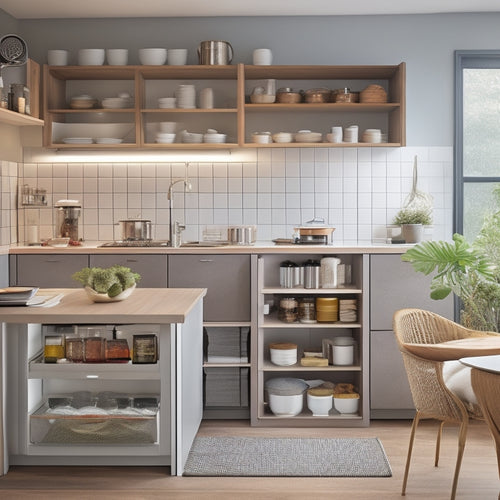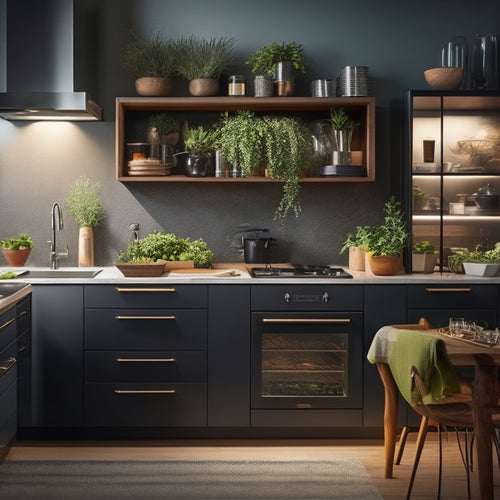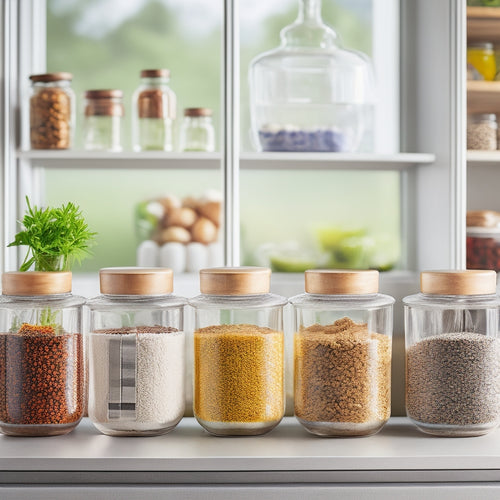
10 Digital Tools to Organize Your Kitchen Inventory
Share
You can greatly reduce kitchen chaos and food waste by implementing a digital inventory system that tracks your ingredients, cookware, and cleaning supplies, and streamlines your pantry organization, meal planning, and grocery shopping. To get started, define what to track, categorize and prioritize items, and align your system with your kitchen goals and cooking routines. Digital tools can help you monitor stock levels, expiration dates, and storage locations, and even alert you when it's time to restock or use up items. From pantry organization to meal planning, discover the top 10 digital tools that can transform your kitchen inventory management, and take the next step towards a more efficient and organized kitchen.
Key Takeaways
• Implement a reliable pantry inventory tracking system to monitor stock levels, expiration dates, and storage locations digitally.
• Categorize and prioritize inventory items based on kitchen goals, cooking routines, and frequency of use for efficient meal planning.
• Utilize digital tools to set alerts for low inventory warnings, supply restocking, and expiration dates to reduce food waste and save time.
• Organize recipes digitally to discover new cooking techniques, connect with a cooking community, and customize recipes to suit preferences.
• Streamline grocery shopping by adding necessary ingredients to digital lists, tracking expenses, and planning weekly meals to stay within budget.
Mastering Kitchen Inventory Systems
You start mastering kitchen inventory systems by defining what you want to track, whether it's ingredients, cookware, or cleaning supplies, and determining how you want to categorize and prioritize your inventory. This clarity will help you create a system that aligns with your kitchen goals and cooking routines.
Ask yourself, what're your kitchen goals? Are you trying to reduce food waste, save time, or cook healthier meals? Knowing your goals will help you focus on what to track and how to organize your inventory.
Next, consider your cooking routines. Do you cook daily or only on weekends? Do you have a set menu or like to experiment with new recipes? Understanding your cooking habits will help you determine the frequency of inventory checks and what items to prioritize.
Streamlining Pantry Organization Tools
As you work on streamlining your pantry organization, you'll want to start by tracking your pantry inventory - what you have, how much, and when it expires.
Next, you'll need to implement a pantry organization system that makes sense for your space and cooking habits.
Pantry Inventory Tracking
Streamlining pantry organization tools begins with implementing a reliable pantry inventory tracking system that efficiently monitors stock levels, expiration dates, and storage locations. By doing so, you'll be able to identify what you have, what you need, and what's approaching expiration. This helps reduce food waste and saves you money. With a well-organized pantry, you can plan meals and make cooking hacks a breeze. You'll no longer find yourself standing in front of an open pantry, wondering what to make for dinner.
Digital tools make pantry inventory tracking a cinch. You can use apps or spreadsheets to log your items, track quantities, and set reminders for expiration dates. Some apps even allow you to scan barcodes or upload receipts to make tracking easier. By regularly updating your inventory, you'll be able to identify patterns and plan your meals accordingly. This not only reduces food waste but also saves you time and effort in the long run.
With a reliable pantry inventory tracking system in place, you'll be able to cook with confidence, knowing exactly what you have on hand.
Pantry Organization Systems
Effective pantry organization systems rely on categorizing and assigning a home to each item, ensuring that everything has a designated place and making it easy to find what you need when you need it.
When designing your pantry organization system, consider the Pantry Aesthetics - you want it to be visually appealing and functional. Start by grouping similar items together, such as baking supplies, snacks, or spices. Then, use Shelf Dividers to separate these categories and keep them organized. This will prevent clutter from building up and make it easier to restock when you're running low.
Next, think about the frequency of use and store your most-used items in easy-to-reach locations. Label each shelf or category so you can quickly identify where everything is.
Food Storage Management
You'll want to implement a food storage management system that keeps track of expiration dates, monitors food quantities, and alerts you when it's time to restock or use up items approaching their expiration dates. This system is vital for maintaining food safety and reducing waste. By using digital tools, you can easily keep track of your stored food and make sure that you're consuming the oldest items first.
A well-organized food storage system also allows you to identify storage strategies that work best for your kitchen. For instance, you can use the 'first in, first out' rule, where you store new items behind older ones to ensure that older items are consumed first. You can also categorize your stored food into groups, such as grains, canned goods, and baking supplies, to make it easier to find what you need.
Digital Cooking Recipe Managers
With a digital cooking recipe manager, dozens of cookbooks worth of recipes can be stored, searched, and accessed at your fingertips, freeing up valuable kitchen space and reducing clutter. You'll no longer need to sift through piles of cookbooks or scribbled notes to find your favorite recipe. Digital recipe managers provide a convenient way to organize and categorize your recipes, making meal planning and grocery shopping a breeze.
Here are just a few benefits of using a digital cooking recipe manager:
-
Recipe Inspiration: Discover new recipes and cooking techniques from a community of fellow home cooks and professional chefs.
-
Cooking Community: Connect with others who share your passion for cooking and exchange recipes, tips, and advice.
-
Easy Meal Planning: Plan your meals for the week, generate grocery lists, and keep track of your nutritional intake.
- Recipe Customization: Scale recipes up or down, make substitutions, and add notes to make recipes your own.
Inventory Tracking and Reporting
As you start using digital tools to organize your kitchen inventory, you'll want to set up a system that keeps you informed about your stock levels and expiration dates.
You'll receive stock level alerts when it's time to restock, ensuring you never run out of essential ingredients.
Stock Level Alerts
By setting stock level alerts, you can receive notifications when your kitchen inventory reaches a predetermined threshold, ensuring you never run out of essential ingredients or supplies. This feature is particularly useful for high-volume kitchens where stock levels can fluctuate rapidly. With stock level alerts, you'll never be caught off guard by a sudden shortage of critical items.
Here are some examples of how stock level alerts can benefit your kitchen:
-
Low inventory warnings: Receive notifications when stock levels fall below a certain threshold, allowing you to reorder supplies before they run out.
-
Supply notifications: Get alerts when it's time to restock popular ingredients or supplies, ensuring you always have what you need on hand.
-
Automated ordering: Set up automatic orders for items that regularly run low, streamlining your inventory management process.
- Inventory optimization: Use stock level alerts to identify slow-moving items and optimize your inventory to reduce waste and save money.
Expiration Date Tracking
You can guarantee that perishable items are used before they expire by tracking expiration dates, thereby reducing food waste and saving your kitchen money. This essential step ensures food safety and prevents the risk of consuming spoiled or contaminated food.
By keeping track of expiration dates, you can prioritize the use of items nearing their shelf life, making sure they're consumed before they go bad.
Digital tools can simplify expiration date tracking, allowing you to easily input and manage dates for each item in your inventory. You can set reminders or alerts to notify you when items are approaching their expiration dates, ensuring you use them in time. This feature is especially useful for high-risk items like dairy products, meats, and eggs.
Meal Planning and Grocery Lists
Organizing your kitchen inventory starts with a clear plan of what meals you'll be making, and digital tools can help you create and manage your meal planning and grocery lists with ease. You can find inspiration for new recipes online, and then add the necessary ingredients to your digital grocery list. This way, you'll avoid buying unnecessary items and reduce food waste.
Here are some benefits of using digital tools for meal planning and grocery lists:
-
Recipe Inspiration: Browse through recipe websites and apps to find new meal ideas, and save them to your digital recipe book.
-
Meal Budgeting: Set a budget for your meals and track your expenses to make sure you're staying within your means.
-
Automated Grocery Lists: Add ingredients from your recipes to your digital grocery list, and organize them by aisle or category.
- Meal Planning Calendar: Plan your meals for the week, and schedule them on a digital calendar to make sure you're using up all the ingredients you buy.
Kitchen Supply Chain Management
How do you guarantee that your kitchen staples, from spices to baking supplies, remain stocked and fresh, without overbuying or running out at the wrong moment? Effective kitchen supply chain management is important to ensuring you always have what you need to serve others.
This involves building strong relationships with reliable Supply Partners who can provide consistent quality and timely delivery. By streamlining your Logistics Optimization, you can reduce waste, save time, and minimize costs.
This means implementing a system to track inventory levels, monitor usage rates, and automate reordering when necessary. With digital tools, you can set up notifications for low stock levels, receive alerts for expiring products, and even schedule deliveries to coincide with your busiest periods.
Barcode Scanning and Labeling
By implementing barcode scanning and labeling, your kitchen inventory management becomes more efficient, allowing you to quickly identify and track products, reduce stockroom errors, and optimize storage space. This digital tool empowers you to streamline your inventory process, making it easier to manage your kitchen supplies.
With barcode scanning and labeling, you can:
-
Authenticate products by verifying their authenticity, reducing the risk of counterfeit items in your kitchen.
-
Optimize storage space by accurately tracking inventory levels and identifying slow-moving items.
-
Streamline supply chain operations by efficiently tracking products from receipt to storage.
- Reduce stockroom errors by minimizing manual data entry and reducing the risk of human error.
Automated Expiration Date Tracking
When you implement automated expiration date tracking, you'll receive timely reminders about perishable items approaching their expiration dates, ensuring you use them before they go bad.
This feature also generates reports that provide a clear overview of your inventory's expiration status, helping you plan meals and make informed purchasing decisions.
With real-time updates, you'll always know what's expiring soon, allowing you to adjust your kitchen inventory accordingly.
Expiration Date Reminders
You can guarantee that perishable items in your kitchen inventory don't go to waste by setting up automated expiration date reminders, which send alerts and notifications to your phone or email when an item is approaching its expiration date. This feature is a game-changer in reducing food waste and ensuring you make the most of your kitchen inventory.
Here are some examples of how this feature can benefit you:
-
Dairy products: Receive reminders when milk, yogurt, or cheese are nearing their expiration dates, so you can plan recipes or consume them before they spoil.
-
Meat and poultry: Get alerts when raw meat or poultry are approaching their expiration dates, ensuring you cook or freeze them on time.
-
Fresh produce: Stay on top of fruit and vegetable expiration dates to minimize waste and maintain a fresh supply.
- Canned goods: Even canned goods have a shelf life; set reminders to use them before they expire or go bad.
Auto-Generated Reports
Auto-generated reports offer a thorough overview of your kitchen inventory, automatically tracking expiration dates and flagging items that require immediate attention. With these reports, you'll never miss an essential expiration date again, ensuring the food you serve is always fresh and safe.
The data visualization capabilities of these reports provide a clear and concise picture of your inventory, helping you identify trends and patterns that can inform your business decisions. You'll gain valuable business insights, such as which products have the shortest shelf life, which suppliers provide the longest-lasting ingredients, and where you can optimize your inventory management.
These reports also enable you to track inventory levels, monitor stock turnover, and identify slow-moving items. By leveraging this data, you can refine your inventory management strategy, reduce waste, and improve your bottom line.
With auto-generated reports, you'll be empowered to make data-driven decisions that drive your kitchen's success.
Real-Time Inventory Updates
With real-time inventory updates, your kitchen's inventory management system keeps perpetually synchronized, guaranteeing that every item's expiration date is accurately tracked and updated the moment it's received, stored, or consumed. This means you'll always have a clear picture of what's in stock, what's expiring soon, and what needs to be reordered.
Here are some benefits you can expect from real-time inventory updates:
-
Cloud syncing guarantees that all devices connected to your inventory management system are updated simultaneously, eliminating errors and discrepancies.
-
Instant alerts notify you when items are approaching their expiration dates, allowing you to plan meals, adjust orders, and reduce food waste.
-
You'll be able to identify slow-moving items and adjust your inventory accordingly, freeing up storage space and reducing unnecessary purchases.
- With accurate, up-to-the-minute inventory tracking, you can confidently plan meals, make informed purchasing decisions, and provide excellent service to your guests.
Smart Kitchen Storage Solutions
Maximizing your kitchen's storage capacity is essential for maintaining an organized inventory, and smart kitchen storage solutions can help you achieve this goal.
When designing your kitchen layout, consider the 'golden triangle' concept, where your sink, stove, and refrigerator form the points of a triangle to optimize workflow and storage.
Implementing storage hacks like adjustable shelves, baskets, and hooks can also help maximize your kitchen's storage potential.
Customizable Kitchen Inventory Templates
You can streamline your kitchen inventory management by utilizing customizable templates that cater to your specific needs and preferences. This way, you can efficiently track your kitchen supplies, ingredients, and equipment, ensuring that you always have what you need to prepare delicious meals for your loved ones.
Here are some ways customizable templates can help you organize your kitchen inventory:
-
Categorize by kitchen layout: Organize your inventory by the different areas of your kitchen, such as pantry, fridge, or countertops.
-
Track recipe ingredients: Keep a record of the ingredients you need for your favorite recipes, making it easy to restock when you run low.
-
Manage recipe books: Digitize your recipe books and organize them by course, ingredient, or cooking method.
- Set reminders for expiration dates: Receive notifications when perishable items are approaching their expiration dates, so you can use them before they go bad.
Frequently Asked Questions
Can I Use Digital Tools for Organizing a Large Kitchen Inventory?
You're wondering if digital tools can tame the chaos of a large kitchen inventory. Absolutely! A digital inventory overhaul can streamline your space with efficient digital decluttering, making it easier to serve others with precision and care.
Are Digital Kitchen Inventory Systems Compatible With Android Devices?
You'll be delighted to know that most digital kitchen inventory systems are designed to be device-agnostic, so you can easily access them on your Android device via the Google Play Store, ensuring seamless device compatibility.
How Do I Transfer Data From an Old Inventory System to a New One?
When transferring data from an old inventory system to a new one, you'll need to facilitate data migration through system integration, ensuring a seamless changeover by exporting and importing data, or using a third-party migration tool.
Can I Share Kitchen Inventory Access With Family Members or Roommates?
Like a master chef delegating tasks, you can share kitchen inventory access with family members or roommates by assigning permission levels and user roles, ensuring everyone's on the same page without compromising control.
Are There Digital Tools for Tracking Food Waste and Reducing Kitchen Waste?
You can reduce kitchen waste by tracking it with a Food Diary, where you log everything you toss. Then, use Waste Analytics to identify patterns and areas for improvement, helping you make conscious changes to minimize waste and serve your community better.
Related Posts
-

Space-Saving Kitchen Solutions for Busy Homeowners
To maximize your kitchen's potential, start with vertical storage solutions like wall-mounted shelves and pegboards f...
-

Smart Kitchen Countertop Storage Innovations
Smart kitchen countertop storage innovations are transformative for maximizing your kitchen's potential. You can clea...
-

Stackable Kitchen Containers for Dry Goods
Stackable kitchen containers are perfect for organizing dry goods and maximizing your kitchen space. They help reduce...


